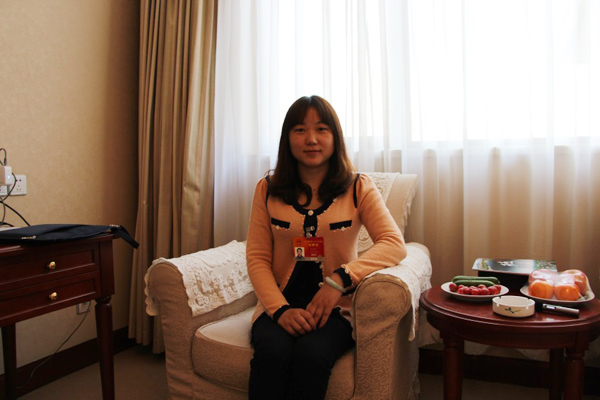 |
|
Zhu Xueqin, a grass-roots deputy who has not forgotten her roots. [Photo/Ma Chi] |
With her rich, luxurious hair and clothes that exude style and confidence, deputy to the National People's Congress Zhu Xueqin looks more like a corporate executive than a champion of migrant workers.
Born in a rural family in East China's Jiangsu province, Zhu, like so many of her peers, left the village to look for a job at 17.
She joined a Shanghai garment company and started working on the assembly line. Initially, she found it difficult to keep pace with the veteran workers. So she decided to spend two hours every day learning sewing techniques.
Within three months she became a skilled tailor. But Zhu wanted more.
She enrolled in self-study courses and received high school diploma in three years. Later on she learned Japanese during an overseas training program.
"I credit my success to self-discipline and hard work,"said Zhu, now a deputy to the National People's Congress, China's parliament. "I know that the conditions in which migrant workers live are often harsh, but you have to look at the positive side and keep working hard and keep learning.”
Zhu's fame as an outstanding seamstress and a model worker began to rise. After finding her own success, Zhu started reaching out to those in need.
She went to a juvenile prison to share with young offenders of rural background her experiences, she helped support students in need and took care of seniors at nursing homes; and donated money to victims of Wenchuan earthquake.
In 2008, Zhu was elected a deputy to the National People's Congress along with two other grass-roots workers. Since then, she has spoken for 200 million migrant workers in China.
"Being a NPC deputy pushes me to think of migrant workers' needs and their difficulties,"said Zhu. "It's a great responsibility.”
The first year she attended the "two sessions”, she called for a unified social security net to help migrant workers enjoy the benefits no matter where they worked.
She also set up a legal assistance office to help them settle disputes, mainly about payment delay, with their employers. Her legal office has been successful in getting back about one million yuan of wages for more than 30 migrant workers in 2014.
At this year's annual session of the NPC, Zhu Xueqin will propose to raise awareness of migrant workers on using legal tools to protect their rights.
"Many migrant workers have never heard of the law on punishing employer who delays wage,"Zhu said. "The media should do more to make the newly enacted law known to migrant workers.”
According to an amendment in China's Criminal Law in 2011, bosses who withhold their employee's wages will be held criminally accountable.
In another proposal, Zhu Xueqin calls for further promotion of security deposit system in labor-intensive industries such as catering and construction. Under the system, an employer has to deposit money in bank accounts earmarked of payment to migrant workers in case he defaults on wages or hide to avoid trouble.
"The security deposit system has been put in trial operation in some cities, and a wider application of the system will protect more migrant workers from payment delay,"said Zhu.
Related Stories